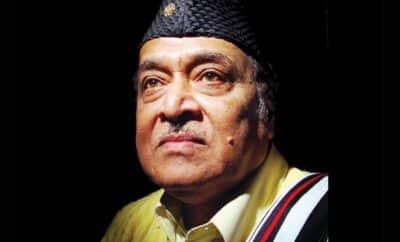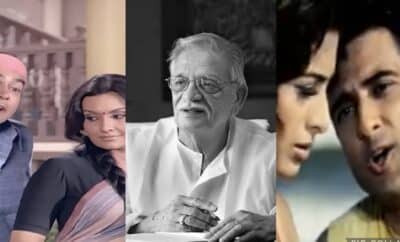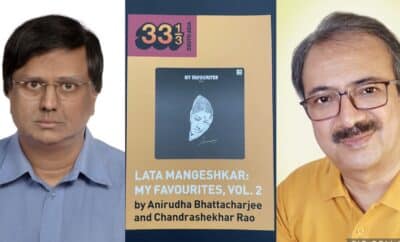Song Sketch
Aye Mere Dil-e-Nadaan – Tower House – Distressed Philosophy
Self-help is the best help, they say. Particularly when you are seized by calamities from all the sides and no help is in vision, the best way is to face the reality bravely and fight it resolutely. The song Aye mere dil-e-nadaa, tu gham se na ghabrana from Tower House (1962) gives exactly the same message. The song is composed by Ravi, penned by Asad Bhopali and sung by Lata Mangeshkar.
The heroine of the film Sabita (played by Shakila) is devastated by her father’s murder. She has lost her mother long back and her lover Suresh (played by Ajit), who worked for her father, has also gone away, on being retrenched by her father out of some misunderstanding. She is now feeling dejected, lonely without any shoulder to cry on in this time of deep grief.
While her depression is deepening, she suddenly remembers the song that her mother used to sing. After a stirring piece of flute, brief guitar strums and a piece of violins, she starts singing –
Aye mere dil-e-nadaan, tu gham se na ghabrana,
Ik din to samajh legi duniya tera afsana…
Oh my silly heart! Don’t be intimidated by sorrows. Don’t lose hopes, someday the world will understand and appreciate your legend.
While the first line through which she is trying to pacify her mind starts in the middle octave, the second line starts with high notes in the upper octave, as she is bringing on her resolution. The determination is very clearly seen also in Shakila’s eyes and body language, when she repeats the mukhda.
Then comes a couple of heart-wrenching pieces of violins accompanied by the robust percussion and the dampened heart now starts throbbing heavily… Not only hers, but also yours!
She sings on –
Armaan bhare dil mein zakhmon ko jagah de de,
Bhadke hue sholon ko kuchh aur hawa de de,
Banti hai to ban jaye ye zindagi afsana…
All your wishes are burnt; they will never see the light of day now. What is the use of then letting them clutter your mind? Clear the clutter and make some space for the scars that will accompany you for life.
After her expression of anguish, the second interlude starts with intense pieces of flute followed by short pieces of violins, and adds to the sullenness. Having realised the futility of her hopes, she starts saying a few words of wisdom to herself:
Fariyaad se kya haasil? Rone se nateeja kya?
Bekaar hain ye baatein, in baaton se hoga kya?
Apna bhi ghadi bhar mein ban jaata hai begaana…
Now complaining will be useless, like banging your head against the wall. Shedding tears will be in vain, like crying in the wilderness. Haven’t you seen how the closest one becomes a stranger in the blink of an eye?
However, all this does not help, as her troubles soon increase after a wicked man starts torturing her. Having given up eventually, when she is about to commit suicide, she is stopped by a few lines coming from a distance after a few pieces of mysterious music –
Maalik ne tujhe dee hai ye zindagi jeene ko,
Toofan mein rahne de tu apne safeene ko,
Jab waqt ishara de, saahil pe pahunch jaana…
Don’t finish at once the life that the Almighty has given. Keep on sailing in the storm for some more time. In due course, you will reach the shore safely.
Feeling that it is her mother’s spirit who is stopping her from committing suicide, she changes her mind and goes back.
Wait, it’s not over yet! The song has another version. Towards the end of the film, when the hapless Sabita goes to the abandoned building in which her mother had committed suicide and starts wandering aimlessly, she gets to hear the song in an eerie voice of an invisible entity. This is the other version, with similar lines as the first version discussed above. However, this version has a preamble too –
Aaj ki raat andhera hai, tanhaai bhi,
Koi is raat ki tanhaai mein humraaz nahin..
Aasmaan chup hai, zameen chup hai, zamaana chup hai,
Koi saaya, koi aahat, koi aawaz nahin..
Through these words and spooky music, the preamble sets the tone of this uncanny version of the song.
This haunting song with an enamouring tune and apt orchestration with only a few instruments is one of the best examples of the creativity of Ravi – a capable but grossly underrated music director. Lata Mangeshkar’s mesmerising rendition does a perfect justice to the mood of the song, as usual. She maintains the subtle expression of despair and desolation in her voice end to end.
Last but not the least – Asad Bhopali’s lyrics convey the girl’s distress and her determination amidst the distress perfectly – high philosophy in simple words. Asad Bhopali – described as “one of the few names that stand out for their contribution to Hindi film lyrics” in the Encyclopaedia of Hindi Cinema, compiled by Gulzar and Saibal Chatterjee – had the capability to express several feelings in uncomplicated but befitting words. In spite of this capability, he could not make it to the front row of Hindi lyricists and has only a handful of popular songs to his credit, largely because many of the films he wrote foe were low-grade films.
The movie Tower House was also not a high-grade popular movie. However, its music composed by Ravi, more so this spell-binding song has always remained popular among the discerning audience; and will always be counted among the classics of Ravi and Lata Mangeshkar.
The video below has the preamble to the chilling second version combined with the first version followed by the third stanza that Sabita hears when she is about to commit suicide –




Madhupati Sharma
July 10, 2020 at 4:19 pm
The remorse and the revolt are so well taken in the lyrics. Fariyaad se kya haasil… and you are a good analyst of chemistry in the song, good in dissecting the anatomy of composition and a good physicist to understand gravity of the song.
Ajay Poundarik
July 10, 2020 at 7:33 pm
Would have love to see/read on the association of Asad Bhopali & Laxmikant-Pyarelal. This combo have given many memorable songs.
Woh Jab Yaad Aaye…Parasmani 1963
Mere Dil Mein Halki Si ..Parasmani 1963
Hum Pyar Kiye Jayenge .. Aaya Toofan 1964
Abhi Kamsin Ho..Aaya Toofan 1964
Allha Kare Tu Bhi ..Mr. X In Bombay 1964
Almost All Songs of “Hum Sab Ustaad Hai” 1965
Ajnabi Tum….Hum Sab Ustaad Hai
Pyar Baantate Chalo ” ” ”
Kya Teri Jhulphe Hain ” ” ”
Bade Bewafa Hai Ye…Roop Tera Mastana
Many More
Biswajit Chatterjee
July 10, 2022 at 11:21 am
Well penned.. the way you illustrated the character’s emotions with the lines, was easy for the reader to visualise the pain!
Yogesh
July 10, 2022 at 3:12 pm
Thanks, Biswajeet!
Virender
July 10, 2022 at 11:20 am
Beautifully analysed ??????
Yogesh
July 10, 2022 at 3:12 pm
Thanks, Virender ji!